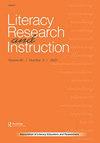阿拉伯语儿童的单词学习和故事复述有哪些贡献?一项电子书阅读干预调查
IF 1.1
Q3 EDUCATION & EDUCATIONAL RESEARCH
引用次数: 1
摘要
摘要使用带词典的电子书对现代标准阿拉伯语单词学习和故事复述进行了测试。一百六十三名讲阿拉伯语的幼儿园儿童被随机分为五组。实验组用字典阅读电子书:(1)附有动态插图和单词发音请求;(2) 有一个动态的插图,没有要求说出这个词;(3) 带有静态插图和要求说出单词;(4) 带有静态插图而无需发声。对照组在没有字典的情况下阅读这本书。在干预前后测试了电子书单词的接受和表达意义以及故事复述技能。孩子们用字典阅读电子书,字典中有目标词的动态呈现和单词的重复发音,他们在目标词的含义和故事复述方面都有所改善。初始水平较低的儿童进步更大。讨论了教育意义。本文章由计算机程序翻译,如有差异,请以英文原文为准。
What Contributes to Word Learning and Story Retelling of Arabic-speaking Children? Investigation of an E-book Reading Intervention
ABSTRACT Learning words in Modern Standard Arabic (MSA) and story retelling was tested using an e-book with dictionary. One hundred and sixty-three Arabic-speaking kindergartners were randomly divided into 5 groups. The experimental groups read the e-book with a dictionary: (1) with a dynamic illustration and a request to vocalize the word; (2) with a dynamic illustration without a request to vocalize the word; (3) with a static illustration and a request to vocalize the word; (4) with a static illustration without a request for vocalization. The control group read the book without a dictionary. Receptive and expressive meaning of the e-book’s words and story retelling skills were tested pre- and post-intervention. Children who read the e-book with a dictionary with dynamic presentation of target words and repeated vocalization of the words showed improvement in target words meaning and story retelling. Children with a lower initial level progressed more. Educational implications are discussed.
求助全文
通过发布文献求助,成功后即可免费获取论文全文。
去求助
来源期刊

Literacy Research and Instruction
EDUCATION & EDUCATIONAL RESEARCH-
CiteScore
2.70
自引率
8.30%
发文量
18
期刊介绍:
Literacy Research and Instruction (formerly Reading Research and Instruction), the official journal of the College Reading Association, is an international refereed professional journal that publishes articles dealing with research and instruction in reading education and allied literacy fields. The journal is especially focused on instructional practices and applied or basic research of special interest to reading and literacy educators. Peer Review Policy: All articles in this journal have undergone rigorous peer review, based on initial editor screening and anonymous refereeing by reviewers.
 求助内容:
求助内容: 应助结果提醒方式:
应助结果提醒方式:


